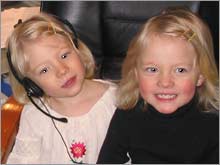Master the working-mom shuffle
This Mother's Day lose the guilt and look at the bright side of balancing kids and career.
Instead, I work four days a week, count on my husband to take on key parenting duties and "let someone else raise my children" about 25 hours a week. (Someone else, where were you last night? The kids woke me up three different times.) Like a lot of working moms, there are days or weeks when I feel guilty and completely overwhelmed. Take recently, when I overheard Isabel tell Fiona, "When the little hand gets on the five, then you can have your mommy." I was heartbroken. I deconstructed that sentence a hundred times. "I pick them up at 4 o'clock, so why would Isabel say 5 o'clock?" I talked to my friends about juggling kids and career. "It's always on my mind, especially lately," said my friend Rima. "Sometimes I'm up at 4 a.m. just to get the hours in." I talked to my editor, came close to quitting my job, and then decided I wouldn't be happy expressing myself with construction paper. I also decided I'd wasted so many of my precious work hours obsessing about my issues I better turn the experience into something productive. So in honor of Mother's Day, I've been frantically researching the working mother's struggle to balance children, marriage, household, career and selfish indulgences, like showering and sleeping. The bad news: There are still only 24 hours in the day. The good news: Research shows that children who go to daycare are not destined to be juvenile delinquents. Employers are waking up to the advantages of flexible work schedules. Dads are taking on more parenting duties -- and kids are better for it even if their clothes don't always match. In fact, working moms would be wise to take cues from their working-dad husbands. Guilt is not a daily emotion for most working dads, said Carol Evans, CEO of Working Mother Media, publisher of Working Mother magazine, and mother of two teenagers. "They are very proud of the time they spend with their children," she said. Look at the bright side. Daycare is not damaging Research shows that children who go to "day school" are no better or worse off than those who stay home. "Whether a child is in childcare or not doesn't seem to make a difference," said Sarah Friedman, project scientist and scientific coordinator for the National Institute of Child Health and Human Development study of early child care and youth development, which began tracking infants in 1991. Although children who spend long hours in daycare may be slightly more prone to behavior problems -- just as adults who spend too much time at the office may be prone to behavior problems -- "the majority of children are in a normal range," said Friedman. "The worries that people had are not well-founded for the majority of the children." A better predictor of how the child will do is the family environment and -- interestingly enough -- household income. "More income seems to create conditions more favorable to development," said Friedman, explaining that this could be for any number of reasons, including that kids pick up on parents' stress over money matters. Dads now in on the balancing act Every morning while I'm in my office a few feet away from my house, I watch the silhouette of my husband as he runs around making breakfast, packing lunches and getting my daughters dressed for school. "Do you think you'd be doing this if I didn't work in the mornings?" I asked him this morning. "No way -- I'm not genetically programmed to match outfits and do ponytails," he said. Yet he and many of his friends are doing exactly that. They're staying home with sick kids, working four-day weeks, asking their employers for extended paternity leave and taking on duties that have traditionally fallen to mothers. "To put it bluntly, I wouldn't allow my husband to not share some of the responsibilities," said my friend Shelley. "This is a phenomenon we're really seeing with your generation," said Evans, referring to a study by the Families and Work Institute that found that Gen X fathers spend an hour more a day with their children than fathers did 25 years ago. "It's a huge shift." Working mothers should embrace this change and encourage it. "Women tend to want to have things done their way," she said. "But instead of micromanaging how things in the house work, let them have some control." In other words, ignore the crooked ponytails and don't worry if the whites and darks all get mixed together. Have it all? How about a compromise? After my friend Gretchen had her son, Jack, she assumed that she would go back to work, same hours, same career path. "You like to think you're the same career-driven person and having a kid won't change me," she said. But motherhood did change her, and Gretchen has no regrets. First she took a cut in pay and title to work four days a week instead of five. Then she left her company to work as a consultant three days a week. "It was a huge risk," she said. "But I feel like I have a perfect balance -- well, usually." Gretchen and a lot of working moms have had to carve out their own jobs to find the perfect balance, but more companies are offering official flextime, telecommuting and job share policies. "We're seeing a big increase in these benefits," said Evans, whose company ranks the 100 Best Companies for Working Mothers. "Flexibility is the number one program parents are looking for in the workplace." Parents, she said, are saying "You can have it all, just not all at once." |
 |
||||||||||||||||||||||||||||

